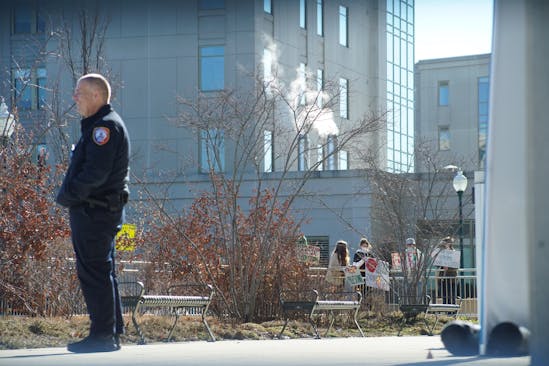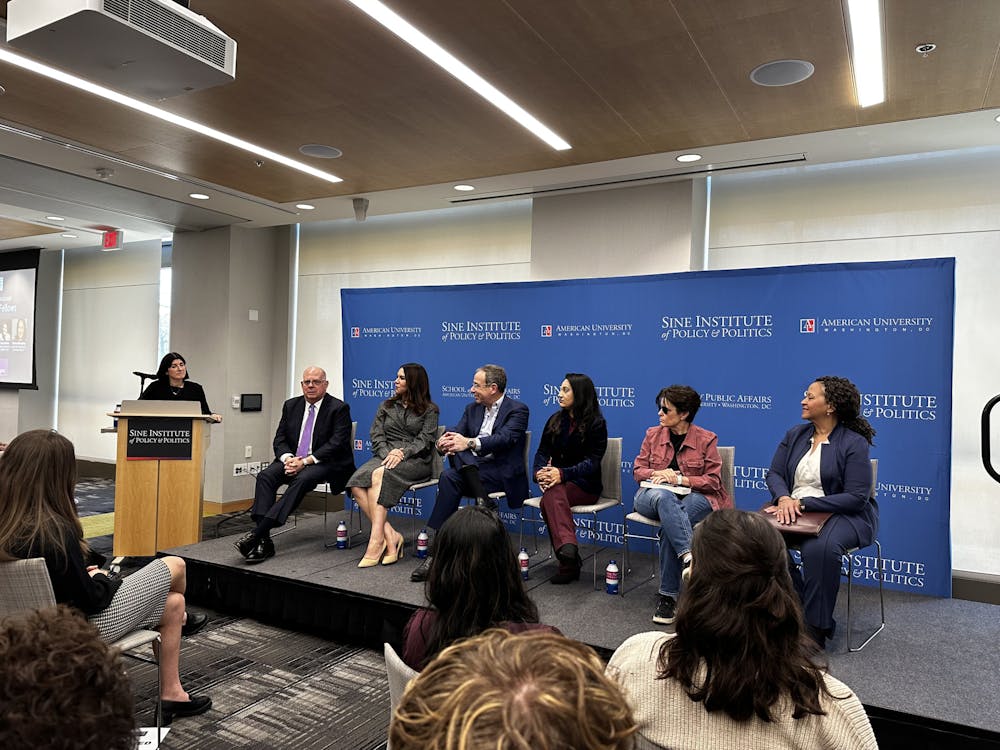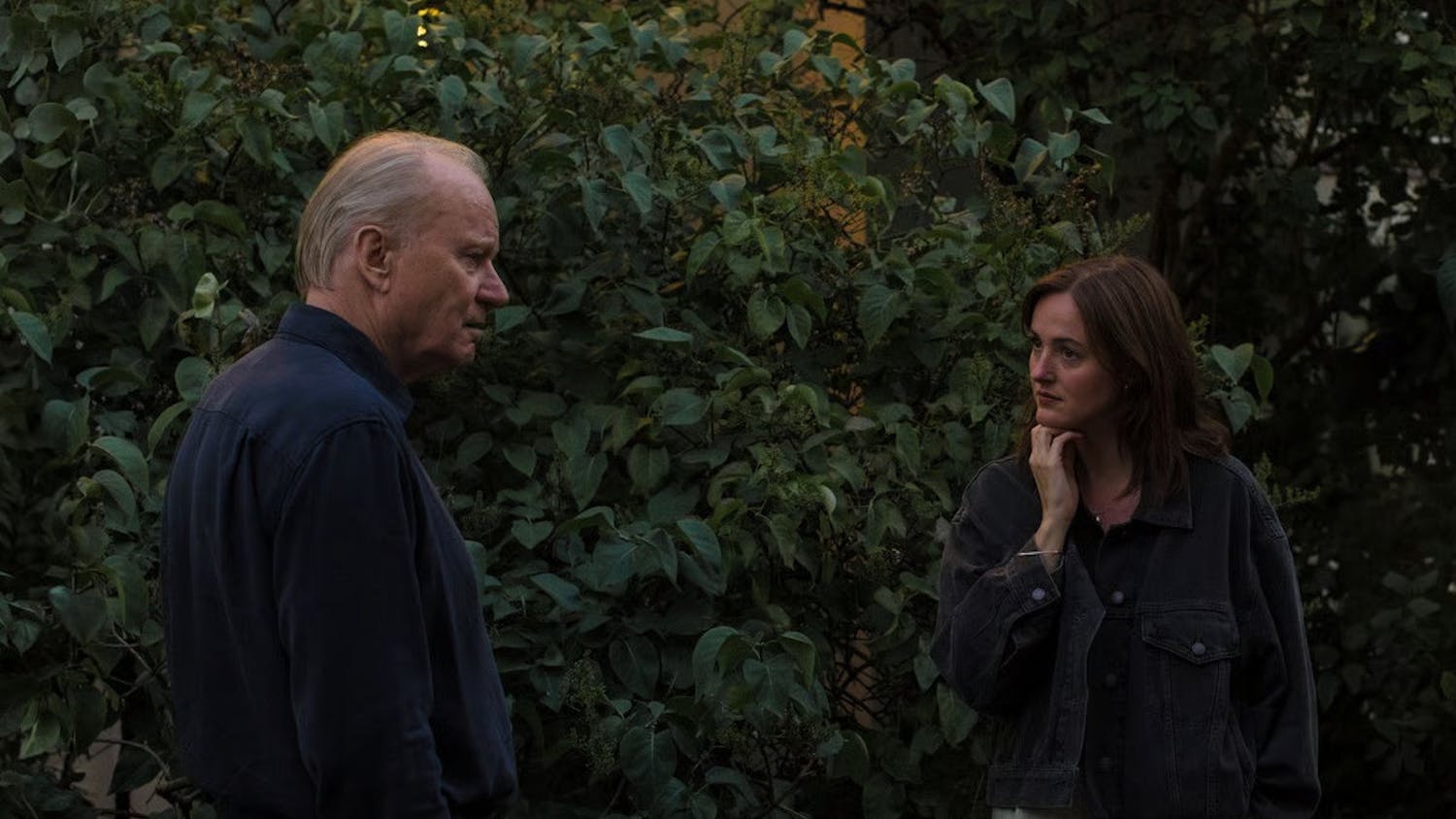The Sine Institute of Policy and Politics, Kennedy Political Union and the Bipartisan Group of American University partnered to introduce and host the Sine Institute’s 2024 fellow class in an event on Feb. 1 in Constitution Hall as protesters gathered outside.
The fellows this year include former Maryland Gov. Larry Hogan, CEO and Founder of Colada Shop Daniella Senior, former U.S. Ambassador to Israel Thomas R. Nides, former Assistant Secretary of State for the Bureau of Economics and Business Affairs Manisha Singh, podcast host Kara Swisher and NAACP Senior Vice President of Global Policy and Impact Patrice Willoughby.

The Sine Institute Fellows program invites fellows “representing a variety of sectors and diverse backgrounds, engaged on a variety of topics with our community,” said Elizabeth Deal, the assistant vice president for community and internal communication.
Nides’ presence as an event speaker drew protestors from the Palestine Solidarity Coalition at AU, a group of over 25 campus organizations “dedicated to supporting the Palestinian cause on campus.” Protestors held Palestinian flags and signs calling on the University to stop supporting Israel.
The event began as moderator Amy Dacey, executive director of the Sine Institute, asked each fellow about their experience, giving them a chance to highlight their work and their upcoming appearances.
Kara Swisher spoke about the growing fear of technology and its merits. Speaking on her decades of experience as a technology reporter, she said she has seen a lack of accountability from technology creators for years.
“Unless our elected officials act, we can’t do anything about it,” Swisher said after speaking about the Congressional Hearing held on January 31st with CEOs of major companies such as X (formerly Twitter), Meta, Discord and TikTok.
Daniella Senior said her upbringing led to her focus on food and policy. She spoke on seeing Latin American cuisine undervalued until her time at the Culinary Institute of America, and how this pushed her to honor her heritage. Senior said the connection between food, community and culture led her to establish Colada Shop. The restaurant, opened in 2016, now has five locations in D.C.
“I seek out to ultimately try to make a change, and teach along the way,” Senior said.
Nides answered a question about his experience in the public and private sector, saying that spending time in both sectors made him a better human being. He added that his time as a government official gave him a unique perspective while working in the private sector as vice chairman at Morgan Stanley.
Tabitha Spence, an attendee at the silent protest and a graduate student in the College of Arts and Sciences, took time during audience questions to ask him about Israel's bombardment of the Gaza Strip. She told The Eagle she came to protest the Sine Institute hosting Nides as a speaker, adding that “all of the speakers in certain ways are complicit in the ongoing genocide that’s happening in Gaza right now.”
Nides responded, “I spent two and a half years as the American ambassador, and I probably spent half my time working on the Palestinian issue. The Palestinian issue which is imperative to support a two-state solution, which I have said 10,000 times.”
Other protestors who did not have pre-registration to the event stayed outside while Spence spoke to Nides. They held signs with pro-Palestine messaging and Palestinian flags.
Deal said the Sine fellowship program aims to connect the AU community with “innovative leaders” and create opportunities to discuss “today’s most important and pressing national and global issues.”
“AU is committed to supporting a sense of belonging to our community,” Deal wrote in a statement to The Eagle. “Fostering civil discourse is an opportunity to support belonging and help the community engage constructively with one another.”
Additionally, Spence said, “our government, and the companies, which are actually sponsors of a lot of the programs here, like the weapons manufacturers, they’re all complicit in this genocide that’s happening right now.”
“While American University may have educational partnerships or grant engagements with defense-related companies on important educational and society issues like cybersecurity, we have no involvement or connection with those companies’ operations in any military actions,” Deal said.
Singh said learning how to operate in other countries as a former assistant secretary of state for the Bureau of Economics and Business Affairs was important, adding that commercial diplomacy helped her promote American companies overseas.
“If you want to truly become a successful multinational enterprise, you need to learn how to go to different countries,” Singh said.
She also said that often Americans themselves serve as the best kind of commercial diplomacy, explaining that visiting other countries, learning their languages and buying their goods all help promote America in the world.
“That sort of commercial diplomacy is so important in presenting a positive view of the United States,” Singh said.
Willoughby spoke about the role of nonprofits in problem-solving and of her history of “stepping out of line” as a Black woman.
“One of the problems that we have in our political system today is being unable to empathize,” Willoughby said. “The nonprofit sector often informs what the government does.” She added that it’s important for all three sectors — public, private and non-profit — to work together.
Hogan spoke of his experience in stepping out of line to run as a Republican in a Democratic state. He talked about his experience being a governor during the COVID-19 pandemic, trying to lead his state and other governors through an unprecedented experience.
“It was quite an experience, and I tried to step up and lead,” Hogan said.
As the conversation drew to a close, Dacey opened the floor to questions from audience members. Questions ranged from career advice to inquiries about the upcoming national election. Panelists reflected on the theme of stepping out of line in their responses throughout the discussion. .
“My advice would be, don’t let anybody ever tell you you can’t do something,” Hogan said. “If you believe you can make a difference, regardless of all the naysayers, get out there and give it all you got.”
This article was edited by Kathryn Squyres, Abigail Turner and Abigail Pritchard. Copy editing done by Luna Jinks, Isabelle Kravis and Sydney Kornmeyer.





